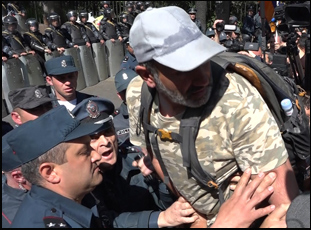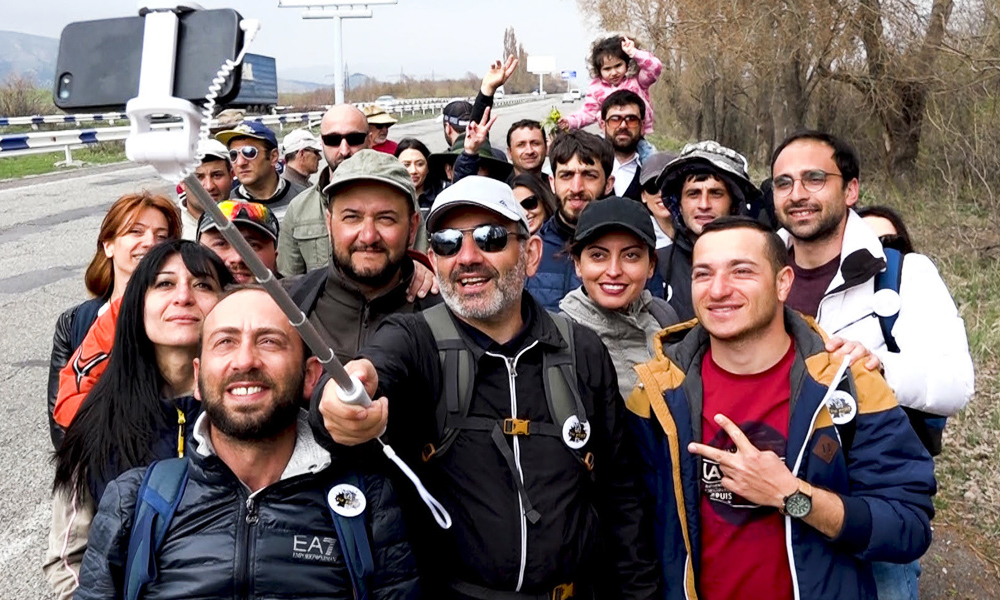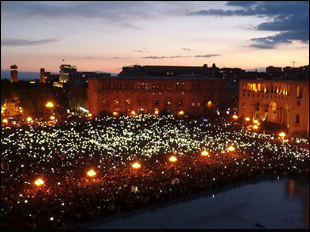If revolutions begin with a single step, Garin Hovanissian made sure that when Nikol Pashinyan first declared he would be challenging Serzh Sargsyan to lead Armenia, after the sitting prime minister had sought a way to extend his term past the legally allowed 10 years one can serve in office, he would be there to follow Pashinyan for the 299,999 steps to follow as the former journalist-turned-politician sought to end years of conservative rule. Scapegoated by Sargsyan’s administration for leading peaceful protests that would ultimately lead to 10 deaths in 2009 when police were dispatched in riot gear, Pashinyan had been biding his time since being taken as a political prisoner the following year and his reemergence on a road just outside Gyumri, with plans to walk to all three major cities in Armenia, began quietly with a video on Facebook Live on Easter Sunday and just as the group around Pashinyan began to grow incrementally as he took strides towards the country’s capital in Yerevan, the camera grew far larger than a phone to properly capture the totality of what the Way Out Alliance leader set out to accomplish.
“I Am Not Alone,” the thrilling result of Hovanissian’s quick thinking and Pashinyan’s remarkable political mobilization efforts in a country that had grown apathetic after numerous attempts to stymie far-right rule had failed, stirs passion no matter where you are in the world as it documents how in less than a month, Pashinyan rallied Armenians to rise up and stop a parliamentary vote that could’ve opened the door for Sargsyan to serve as prime minister indefinitely. Although Hovanissian has extraordinary on-the-ground footage as Pashinyan’s march to freedom engages citizens in the political process once again in the “Velvet Revolution,” leading to rallies that draw tens of thousands to Yerevan’s Republic Square, the film may even be more remarkable in gathering every person of note from all ends of the political spectrum to create a definitive historical record of the 25 days that shook the country to its core. Galvanizing and lively even before the electrifying musical contribution from Serj Tankian, the System of a Down frontman who serves as one of the film’s producers, kicks in, “I Am Not Alone” finds clarity in the chaos of how to motivate people to take action in a time when it’s so easy to become cynical about government affairs.
During the Toronto Film Festival where the film made its world premiere, Hovanissian and Tankian spoke about taking part in a revolution with “I Am Not Alone,” convincing all sides to be involved in telling this story and why it was so nice for a hard-charging rock musician like Tankian to make some joyous music for a change.
Garin Hovanissian: Serj and I have both been very actively following and also involved in political developments in Armenia for a long time, trying to bring democracy and justice and truth to power in that homeland of ours, which has suffered through wars, genocide and also corruption within, especially in the post-Soviet period, since Armenia became independent in 1991. And over the course of the last 25 years, a ruling elite formed in Armenia, people who consolidated the wealth and the power in the hands of the few as the people lived in poverty and hopelessness spread and emigration rates soared. It was really a country in crisis and every challenge to those authorities failed. It seemed that any attempt to bring real change to Armenia was condemned to fail. But everything changed on Easter Sunday.
It just so happened last year a man put on a backpack, went on Facebook Live and said that he was going to begin a revolution — that he was going to walk across Armenia and within a few weeks, if the people believed in it enough, they would bring down this all-powerful regime. The promise of the premise was too good to be true — it was made for cinema. Serj and I were drawn to it from the very beginning, and we were lucky enough to be able to capture it.
Is it true you were already working on another documentary about Serj’s life at the time?
Serj Tankian: Years ago, I started shooting some of my professional experiences from the stage, and the idea was to make a very artist POV type of movie. But I was looking for an ending to the film and when the revolution was going on, I wasn’t thinking about that film obviously, I was following the revolution. And then [I was actually] invited [as part of a group of] diasporan Armenians such as myself, Arsinée Khanjian and Charles Aznavour, who’s no longer with us, to go to Armenia, and the first thought that came into my mind was to call Garin and make sure there’s a camera guy at the airport because this is going to be once-in-a-lifetime kind of unique experience.” So at that time, I thought, “Garin’s got to work on my music film [as well],” and it’s funny because I literally brought the drives to him in my baggage, and we’re talking about this music film. Meanwhile, he’s shooting the revolution. So we’re in these meetings together and and I realized, “Okay, the music film, we’re going to make for sure. But this story has to come out immediately because most people are not going to realize the magic of this particular revolution. This story needs to get out.” And he was already shooting, so we just started talking about working together to get this done.
Was it difficult to mobilize a shoot when this becomes so sprawling in such a short period of time?
Garin Hovanissian: It was very basic. I live in Armenia, so every time there’s been a social movement or some sort of activity on the streets, I love distraction from my writing, so any chance to pick up my camera and go out into the streets and film stuff, I will take that opportunity, and for me, this was yet another movement. If I’m to be honest, I’d love to say that I saw this all coming, but the truth of the matter is that I didn’t. I was drawn to the energy of it and to the possibilities that it presented. I didn’t know where it was going to go, but slowly but surely, I began to realize, and in phone conversations with Serj, who was in L.A. at the time, that “This is becoming a revolution now. This is becoming a film.”
Serj Tankian: Garin was shooting from the beginning because it’s something that he does, and he’s shot many previous attempts at revolutions or further democratization of the country, and he’s been involved in all of those movements. So for him, it was nothing new. But once the revolution actually happened and we realized the importance of this and the uniqueness of this story, I think that’s when we realized what a powerful film this was going to be.
Garin Hovanissian: And I don’t think anybody had the training to cover this revolution. Certainly, the police didn’t have training to manage the revolution and the revolutionaries had no training in realizing it. This was unprecedented. We were all learning how to do our jobs and how to be citizens at the same time. That’s what made it so exciting and so totally unpredictable.
It’s truly extraordinary to see that you get interviews with everyone involved in the story, given the strong political differences at play. Was it a challenge?
Garin Hovanissian: We made a decision early on that this wasn’t going to be a propaganda piece. Obviously, our hearts were on the side of the revolution — we can’t hide that, and we won’t hide that. At the same time, as people who are accountable toward history and the presentation of the facts, we also needed to give representatives of the ruling Republican Party a chance to express their views. Within the context of this film, I thought it was very important to get their side of the story. It wasn’t easy at first because there’s also a trust issue. They know that our sympathies are very likely with the revolutionaries. At the same time, it was a matter of meeting with them again and reasserting for them that, “You’re right, this movie is going to make the revolution look good, but that doesn’t mean you need to look bad. The world is going to learn about this revolution from this movie, and we want you to be a part of that.” And when you watch the movie, I do think the presence of the Republicans actually does help characterize them as human beings who are making their own difficult decisions.

Garin Hovanissian: It clarified a lot. There are so many little moments that came out in the interviews that cameras couldn’t capture, like the relationship between the revolutionary Nikol Pashinyan, and the police captain Valeri Osipyan, who he was constantly clashing against, that your camera wouldn’t know simply by being there. It’s actually a very tender and beautiful story. Part of what I love about this movie, personally, apart from its great political message, is the humanity of it. You get a sense that in this little country on the other side of the world, there are these human beings who are caught up in this revolution and there are people who have these intimate relationships with each other, who know each other, and who are struggling in their various ways for the future of their country.
Serj, at what point were you compelled to actually travel to Armenia yourself to see what was unfolding?
Serj Tankian: Funny enough, I had one of the worst flus, and it wouldn’t go away for like three months, so as the revolution was going on, I was staying up and following this and my nose running. I couldn’t actually fly because I had nasal congestion, but I knew that this was the right movement by talking to friends, so I was waiting to feel a little better so I could go and as soon as I felt a little better, I got on the plane, I took all these drugs — inhalers and Sudafeds — and man, when I landed, I had the experience of a lifetime. I wish everyone could be in my POV and see the elation, the happiness of the people on the street. The word liberated is the only thing that comes to mind — that happiness that you can only see in people that feel liberated and that finally feel in control of their own destiny. I will never forget that. That’s a once in a lifetime moment for me.
Did that contribute to the emotion you put into the film’s music? There’s actually some classical in there.
Serj Tankian: The score was worked on more recently, obviously, because it’s in post-production a year after it’s [shot]. [Garin and I] really kind of honed our creative compatibility with the score and he knew what he wanted as a director, and I tried to just intuitively give the film what I thought it deserved. Watching it in a proper theater last night, for the first time, I realized that the music was always moving, just like Nikol’s walking, and everything’s progressing, so I thought that was very interesting in how it’s framed. I enjoyed doing it.
Garin Hovanissian: The music is very present actually — it has a very active, loud and dynamic role, which is quite rare for documentaries. Serj composed it and we mixed it as if this was a [narrative] feature film and not necessarily a documentary. And as Armenians, we don’t have much practice telling happy stories, and this was a first time for me trying to tell a happy story and [for] Serj, I think you were saying, “Wait a minute, am I writing happy music? Is this coming out positive?”
Serj Tankian: Yeah, this is the happiest music I’ve ever written. [laughs] I’ve always been challenged by happy music. It’s easy for me to write this dark score with orchestra because I’m a rock musician, but I kept on calling [Garin] going, “This might be too happy for a revolution.” And he’s like, “It’s okay, it’s okay. Let’s listen to it.” And it worked.
You mention the premiere. What’s it like to bring this out into the world?
Garin Hovanissian: This isn’t just a movie to us. The secret of our nation, our struggle, the miracle of our democracy is contained in this film, so it’s important to deliver this film to audiences, and it’s important for people to watch this and carry in their hearts with a little more of an understanding of Armenia, and a little bit more of hope as to what they can accomplish in their own lives and nations.
“I Am Not Alone” does not yet have U.S. distribution.





